|
|

The Sex Blog Of Record
ErosBlog posts containing "pornocalypse comes for us all"
September 6th, 2023 -- by Bacchus
Speaking honestly, I’ve sort of let my #pornocalypse coverage lapse recently. Not much has changed in years; corporate social media keeps tightening the noose, formerly adult-friendly places become less so. On the one hand we still have the old-fashioned open web, with the freedom to publish on adult topics but without much access to traffic or to the financial system. The freedom to sleep under a bridge, right?

On the other hand, we have the infamous five websites, which is where all the people are, and from which they mostly will not migrate nor follow any links.

Adult material and links are mostly not welcome there, on the five websites, except to the extent that that this material is disguised from the machine censors by cutesy emojis and twee circumlocutions. If you’re a “spicy accountant” or a “mattress actress”, a lover of “quink” or a “corn” aficionado, a fan of big eggplants or women whose peach icons sometimes spray cartoon raindrops, corporate social media is very much for you.

So yeah, I’ve grown tired of the #pornocalypse beat, and I’ve let lots and lots of pornocalyptic stories glide by without any of my commentary. But yesterday, Pandora / Blake (perhaps best known to ErosBlog readers as the director and publisher of Dreams Of Spanking), published an open Patreon post discussing their frustration at the recent deletion of their kink education channel on YouTube.

Blake’s treatment exemplifies the recent trend in #pornocalypse behavior by the major social media platforms that I first wrote about back in May:
Increasingly the hot new trend in #pornocalypse is social media platforms banning accounts and people not for what they posted/linked, but merely because of who they are. Biggest example was PornHub getting banned from Instagram despite having a whole team of lawyers and creatives making sure their Insta account broke no rules. It’s frustrating, and it’s why I never have the courage to try anything effortful on adult-hostile social media channels.
It used to be common for porn-hostile platforms to tolerate porn-adjacent people, sex educations, and even sex workers, as long as the platform’s specific TOS against adult material were complied with. For many people, this was workable; they’d ride the ragged edge of the TOS for months or a few years, getting specific posts banned and enduring shadow bans, until eventually (and with great pain) they’d lose an account after too many strikes and have to start all over again. You could make a living that way, if you didn’t tire. But, over time, I started noticing that specific TOS compliance stopped mattering. All over porn-hostile social media, people started losing accounts not for any specific violations, but simply because of who they were. If their public identity was too identified with adult topics, they would be banned without warning or appeal, never knowing which posts gave institutional offense. Thus, Blake’s experience:
I’ve been publishing videos on YouTube since 2014, throughout my campaigns against UK porn censorship and age verification. For the last two or three years I’ve been regularly posting original kink education videos, many of which I’ve accompanied with transcripts here on Patreon. The channel mostly consisted of these fully clothed talky adult education videos on topics ranging across consent, BDSM, porn, feminism, queerness, and organisational and self-care strategies. It also included video podcast style interviews with other educators, interviews with adult performers, political campaign videos, and a few carefully cut trailers for spanking films that showed no sex or nudity, but either clothed character interactions and plot snippets (in the case of multi-performer videos) or excerpts from clothed POV fetish talk videos. I suspect it was these latter videos that fell afoul of the content policy, but I have no way of knowing.
…
None of the videos on my channel included sex or nudity. I avoided posting links to any adult sites in the video descriptions, linking to Patreon and mxblake.com instead. … I’m furious that a channel 90% of which consisted of educational material about consensual pleasure and LGBTQIA issues has been summarily deleted without any option to review or edit the content. Was it just those few talky trailers which YouTube objected to so much, or is the entire project of BDSM education in itself too risqué for YouTube?
My speculation is that the answer is “neither”. Rather, I suspect that one or more videos generated enough algorithmic red flags to fall under human eyes, and the human in question applied the new-ish unofficial #pornocalypse policy that’s been spreading so rapidly throughout corporate social media: “If the entity who posted this is any kind of pornographer or sex worker, nuke their whole stinkyporny channel and get them off the platform. Fuck the terms of service! Those words only mean what we pay them to mean, no more and no less.”

For me, the event that dropped the final scale from my eyes was when PornHub got banned from Instagram. If it ever made sense to go dancing with the social media devil while accepting your periodic lumps from the censorship algorithms, it no longer does, in my opinion. PornHub has a whole professional social media team, complete with content creators, editors, and as much legal support as they need. You can guarantee that they posted nothing that contravened Instagram’s TOS, not by the least jot or tittle. Did it matter? No. Throw them into the pit! You and I? We’re not going to fare any better.
I don’t have any solutions to offer, and anyway Blake explicitly isn’t asking for any. So I’ll leave you with Blake’s powerful summary of the state of the #Pornocalypse in 2023:
I mourn the loss of the open internet that was promised us in the early 2000s. My cyberpunk dreams of open peer-to-peer communication and free expression have been repeatedly thwarted, and I’m so angry about it. Fuck Google, their YouTube takeover, and their long-standing policy of devaluing adult sites in search results. Fuck Elon Musk for turning Twitter into his own personal ego trip, and a hotbed of Nazism and transphobia. Fuck Meta for taking over Instagram and enforcing their “family friendly” policies in a way that forces grown adult sex educators to talk about “s3x”, “quink” and “spicy corn”. Fuck Tiktok too, while I’m at it. I hate that in order to reach an audience we’re forced into these privately-owned silos which loathe everything to do with consensual adult sexuality, and which have the power to remove our access to social connectivity at the whim of a badly-trained algorithm.
All of this, every word.
Similar Sex Blogging:
March 12th, 2023 -- by Bacchus
When I coined my now-infamous maxim that the pornocalypse comes for us all, it was a decade ago, and if prompted-AI generative art was a thing in some deep research lab, I certainly didn’t know of it. But now, today, it most certainly is a thing, and its masters and owners emphatically do not want you making porn with it. This menacing message is said to be from the Midjourney generative art tool:

For as long as I’ve been on the pornocalypse beat, I’ve noticed a trend away from the classic pornocalypse (welcome porn users during early stages of a service, then dump them in a bid for respectability at a financial inflection point) towards baked-in pornocalypse: the service has porn-hostile terms of service from its inception.
Meanwhile, I extend a standing invitation: if you, my beloved readers, learn of any publicly-accessible generative-art tools that aren’t crippled by anti-porn “features” and filters, please make sure to let me know of them. That would be ErosBlog fodder for sure.
Similar Sex Blogging:
November 4th, 2022 -- by Bacchus
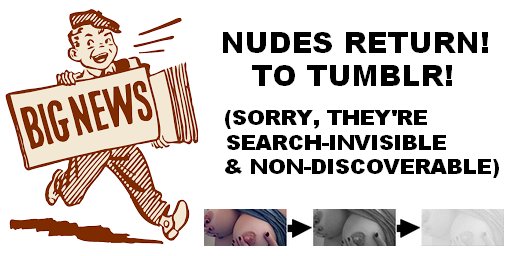
I’m sorry to report that recent news of “mature subject matter” returning to Tumblr is pretty much totally a scam. I mean, you can post it, but nobody can see it. Search invisibility is near total, even for logged-in Tumblr users. So you’re posting into a black hole of non-discoverability. What’s the point?
Let’s get into it. There’s a lot of ground to cover.
September: Rumors Of The Tumblr Un-Pornocalypse
In late September Tumblr issued a sort-of-sideways announcement about their intention to relax the anti-porn rules by introducing new community labels for mature content. However, the announcement was at pains to explain that the actual content policies were not changing at that time. Specifically: “We haven’t updated the official content policies yet.”
I didn’t blog about it, although I did Tweet. As far as I was concerned, it was a nothing-burger. Wake me up when you can show me the fine print about what’s allowed. I also wanted to wait and see if any new adult-content flexibility extends to search discovery both internally and externally. I’ve seen parts of this movie before…
Tumblr Speaks A Truth: Social Media Porn Is A Hard Problem
At roughly the same time as the nothingburger announcement, Tumblr’s Matt Mullenweg posted, to his eternal credit, the single most-honest explanation from a social media platform perspective about why porn-friendly social media is essentially impossible in 2022. In Why “Go Nuts, Show Nuts” Doesn’t Work in 2022 Mullenweg said all the quiet parts out loud and with his full chest:
In 2018, when Tumblr was owned by Verizon, they swung in the other direction and instituted an adult content ban that took out not only porn but also a ton of art and artists – including a ban on what must have been fun for a lawyer to write, female presenting nipples. This policy is currently still in place, though the Tumblr and Automattic teams are working to make it more open and common-sense, and the community labels launch is a first step toward that.
That said, no modern internet service in 2022 can have the rules that Tumblr did in 2007. I am personally extremely libertarian in terms of what consenting adults should be able to share, and I agree with “go nuts, show nuts” in principle, but the casually porn-friendly era of the early internet is currently impossible. Here’s why.
He went on to list, in detail, the barriers imposed by credit card companies, app stores, age and consent verification, and the pornocalyptic reluctance of other companies to provide the necessary service stacks modern websites rely upon. Matt’s essay is a good essay. You go read. I’ll just share part of his conclusion:
If you wanted to start an adult social network in 2022, you’d need to be web-only on iOS and side load on Android, take payment in crypto, have a way to convert crypto to fiat for business operations without being blocked, do a ton of work in age and identity verification and compliance so you don’t go to jail, protect all of that identity information so you don’t dox your users, and make a ton of money [to cover costs].
November: “Bruh! Tumblr Allows Noods Again!”
Nah. Not really. Allow me to explain.
Yesterday was the big day. Tumblr’s new nudity-friendlier community guidelines dropped. They… aren’t completely terrible, if your expectations were as low as mine:
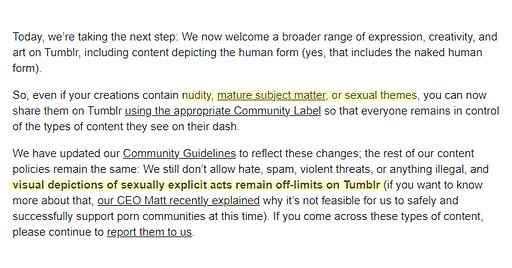
Hardcore porn (“sexually explicit acts”) is still off limits, but the dreaded and mysterious “female-presenting nipple” is back on the menu, everybody!
But… what’s a “sexually explicit act”, you may well wonder? Ha! That’s not defined. Who wants to bet that “gay sexually explicit” and “straight sexually explicit” turn out to be two different things? Or, what about sex education? Demonstrating how to roll condoms onto a banana with your mouth, say? Or… wait! Breaking news from our field reporter on Twitter: sucking a dildo has already been flagged under the new rules, and the appeal apparently rejected. I guess “sextoyly explicit” is the same as “sexually explicit” now?
But wait! There’s more… and it’s worse. The above is Mullenweg’s summary of the new community guidelines. The actual text of the guidelines is rather more crabbed. Specifically, the forbidden “sexually explicit acts” are joined in the naughty booth by “content with an overt focus on genitalia.” What does “overt” mean, do you suppose? Guess! See if you get lucky! Would you have guessed that it included sucking on a sex toy?

So, have I got this right? Nudity is allowed, but if it shows too much pussy and cock, it’s not allowed. Or maybe — we’re guessing here — it’s not too much pussy and cock that gets you in trouble. Perhaps it’s a question of how closely the camera zooms in, or how brashly the genitals in question are displayed. “Overt focus” leaves a lot of room for interpretation, doesn’t it?
Search Invisibility And Your Tumblr Nudes
So, nope. I wasn’t too excited by the nothingburger news in September. But you want to know the real reason for my skepticism? It’s search invisibility. I wanted to see whether the newly-allowable adult content would be searchable, taggable, findable. Because if you can’t search for a thing, or link to it, it might as well not exist.
You all know this routine by now. We’ve written about search invisibility before. The way this scam works is that you can post stuff, but nobody can find it. Your tags don’t work; tag search results don’t have your stuff in it. Your keyword searches don’t work; the results don’t have your stuff. I’ve called this totalitarian in the past, because it’s creepy: people who don’t understand the game just assume your stuff doesn’t exist. “I just don’t understand why nothing comes back when I search for Jenna Jameson nude!” (See next link for answer.)
I first wrote about this happening to Google search suggestions back in 2008. In 2015 or before, Instagram started banning hashtags, sometimes silently and sometimes not. Likewise Pinterest and, yes, Tumblr, although Tumblr in those days had an easter egg pixel-hunt you could do to turn banned searches back on. In 2019, I caught Twitter putting adult stars in search invisibility; their names wouldn’t pop up in the @-name autocomplete function, and the one I tested back then still won’t. These are far from the only examples. I would hazard the proposition that search invisibility is the preferred treatment for grudgingly-allowed adult content on most social media platforms these days.
So what about Tumblr? Yeah, you know it.
To test, I set up an ErosBlog-themed outpost on the new more-lenient Tumblr. (Look for an update when my outpost Tumblr-blog gets inevitably banned, perhaps because of the general porn-hostile social media principle that “if you have an off-platform porn destination/brand they will ban you no matter what content you post.”)
So, yeah, it’s here: tumblr.com/erosblogbacchus. I started with one post, which is a link back to this recent comic/vintage/upskirt post on ErosBlog. Here’s what the Tumblr post looks like to me, logged into Tumblr:
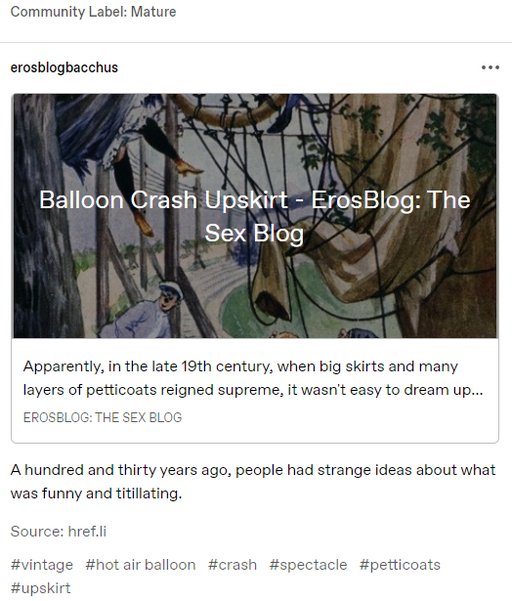
Note the Community Label: Mature flag at the top, which I dutifully set per the new rules because I am such a good social media citizen, and even though this image is not even nude, it is mildly racy and shows a fringe of petticoats.
So, who will find and see that post? Presumably, logged-in Tumblr Users who have their mature content filters set properly in the non-default position, if they also know about my Tumblr blog and have chosen to follow it. That’s gonna be “zero” if nobody can see my posts to ever find out my new blog exists, though. No problem, I’ll just grab the URL and share it elsewhere, because that’s totally how well-functioning social media is supposed to work. Here, look at my post!
Again, if you’re logged into Tumblr and your settings are right, perhaps you see that. But if you’re just a random person coming in from the web (right here!) without an adult-verified settings-optimized Tumbler account, this is what you’ll see:
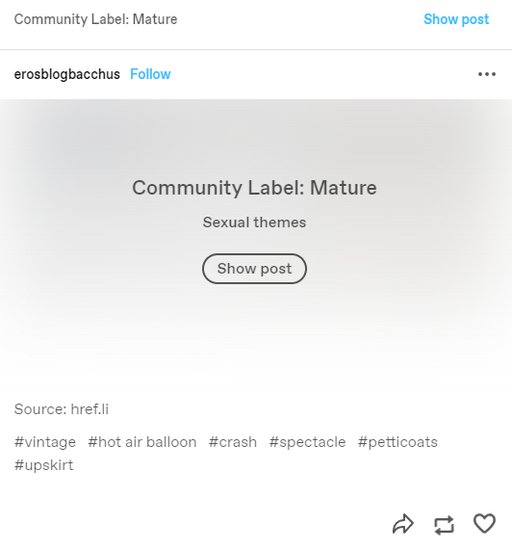
Woo, exciting! “Mature subject matter” is totally back, boyz! Still, I shouldn’t be too negative. Just click that big easy “Show Post” button, right?
If you listen carefully, you can hear the sepulchral laughter echoing from the crypt underneath Tumblr headquarters. Because guess what? Cock-blocked! Yes, my “Community Label: Mature” post is not visible from the open web. Members only:
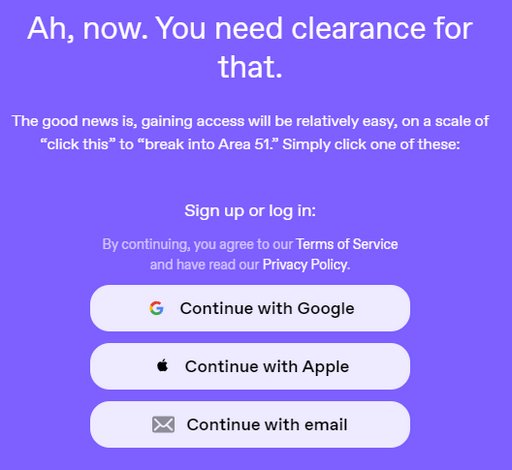
Tut-tut! “Ah, now, you need clearance for that.”
But wait a minute! Back up. What about all those hashtags? What about keyword searches? Surely…

If you’re on Tumblr, try the exercise. Type “Balloon Crash” into the “Search Tumblr” box. You will find a lot of posts, but not mine. Or search the #petticoats hashtag. You’ll get lots of petticoats, some of them pretty sexy, but you won’t find my “Mature”-flagged post. It is thoroughly invisible on this social media platform, for any reasonable definition of “social”. The “mature subject matter returns to Tumblr” storyline is at least 85% pure scam, because of search invisibility.
I had to poke at all of this, so I posted one more post. This one has an actual nude — a vintage nude — in it. Female-presenting nipple! Hashtag: “Vintage Nude”. When I typed in that tag, a little “popular tag” badge popped into view. Awesome! Then I clicked the tag. Not much there. Not my post, for sure! Half a dozen old posts, carefully chosen to avoid the dreaded female nipples. Popular tag? Sure! But only among friends. Only in the dark.
In Conclusion: Tumblr Can Suck My “Overt Focus” Dick
So yeah. That’s where we are. Maybe you can post some stuff on Tumblr today that you couldn’t post last week. But nobody can find it by accident. Nobody can find it by looking for it. Nobody can find it socially. You can’t show it to your off-platform friends. Time will tell if Google can see it, but I’m betting against, and what good would a Google Search result even do you?
Within Tumblr, if people already know you, are following you, have given Tumblr their date-of-birth info, and managed to set the right settings correctly, then sure, those people can now see your mature-subject-matter posts. That’s… not really very much. It’s not social media. At best, it’s in-your-bubble media. Fuck that. Just fuck it. I’m not impressed. Bacchus verdict: Tumblr is NOT back.
Similar Sex Blogging:
February 7th, 2022 -- by Bacchus
This is a long post about how Facebook made the precise mistake I’ve been yelling about since forever. They forgot Bacchus’s First Rule, or stopped thinking it applied to them. And last week, it cost them so many billions of dollars.

I Was There Early: Bacchus’s First Rule Of The Internet, Circa 2004
In various formulations I have preached what I now call Bacchus’s First Rule Of The Internet since 2004, when I got my earliest primitive inkling that social media platforms were the Sarlacc pits where independent websites went to die.
In those distant days, people who wanted to socialize in writing on the internet had started spending more and more time on “blogging services” platforms with primitive social media functionality, rather than making and reading actual free-standing websites. So folks with websites would, increasingly, just move all their shit onto the growing platforms, leaving their old websites behind to dry up and crumble away. Time would pass, and then something (like, for instance, a #pornocalypse event) would destroy their new social media presence, utterly and without recourse.
I believe I got started down this road of thinking when LiveJournal ate the Vintage Sex community. I’m stubborn about not forgetting this shit, and it helps that I have an ancient blog to preserve my ramblings. Whatever little else this old die-hard of a blog may be good for these days, it’s indisputably useful as an aide-mémoire.
After a variety of wording changes in the early years, by 2013 my First Rule finally settled down as follows:
“Anything worth doing on the internet is worth doing on your own server that you control.”
Light Dawns On Marble Head: My Comprehension Grows
In the early days, I honestly thought people were being bone-stupid. Why go put all your content on somebody else’s website — for them to control or delete at a whim — when you could be building your own traffic to your own website? Why give your content and traffic to some other website operator, for free? Why build up their web property instead of your own?
Eventually I came to understand it was not stupidity, but desperation. People in the social media platforms and silos weren’t leaving those spaces. They wouldn’t or couldn’t click away to our websites; our websites were dwindling, not growing. And of course, in the adult space, we feelthy porn people were increasingly not being allowed to put our stuff on the social media sites. Perhaps we were welcome for a short time, when the social media sites were new and desperate for growth. But always, inevitably, the shit would change, and we stinky pornsters would get booted. No exceptions: the pornocalypse comes for us all. I called it in 2013! “Ask not for whom the pornocalypse bell tolls: it tolls for thee.”
Facebook Gets Ever Fatter, And Stupider, Then Stumbles
OK, now put your thumb on the societal fast-forward button. Mash that sucker down hard — as hard as you can! Watch all of the horrible things happen to the web we knew, in a high-speed burst of time-lapsed video, complete with squealing-audio sound effects. Among many other terrible things that happened, Facebook got really huge by eating a lot of other people’s internet lunches. What’s left standing? The infamous five websites (now mostly appearing as apps, which will be important later in this story) are basically it. (That link is to a famous 2018 tweet that says “I’m old enough to remember when the Internet wasn’t a group of five websites, each consisting of screenshots of text from the other four.”) A few vampire tubes bought up most of the porn sites, and the pornocalypse came for just about every last bit of adult content on social media, except on Twitter, where the clock on the time bomb has been ticking for years and getting louder all the time.
But then, last week, Facebook, recently rebranded as “Meta”, had a terrible earnings call, and lost a whole bunch of its market cap in a single trading day:
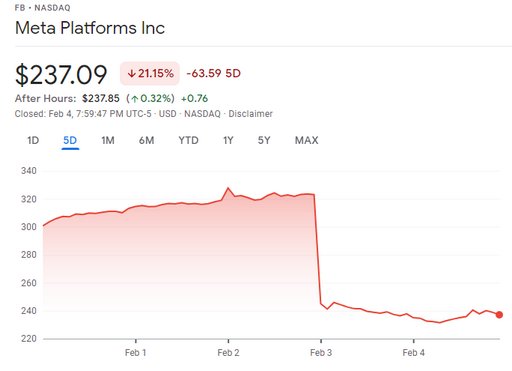
Whoopsie! But what in the hell happened?
The Biter, Bitten: Facebook Ignored Bacchus’s First Rule
What happened? What happened indeed?
I don’t follow Facebook news closely. To a pornographer, pornocalypse platforms are boring and useless. But I do read online news, and over the years I’ve seen Facebook utterly destroy all but the strongest few independent news platform. One by one, they ignored Bacchus’s First Rule: they took their content to Facebook, gave Facebook their traffic, and then got utterly shafted as Facebook deliberately and repeatedly changed the rules on them.
On Friday, Megan McArdle wrote a column in the Washington Post, which is one of the surviving “independent” (from Facebook, anyway) news platforms. It helps that WaPo is the fully-captive plaything of Jeff Bezos, who happens to be that rare creature, a “not Mark Zuckerberg” internet centibillionaire. Thus WaPo can still pay its people, and so they have some good ones. McArdle’s column is headlined We all learned a painful lesson from Facebook. Now Facebook is learning it, too. McArdle adeptly summarizes how Facebook got fat on people who ignored my First Rule. But then, as she explains, Facebook made the same mistake as its victims, leading to last week’s debacle of a one-day $251-billion market-cap loss.
Please allow me my moment of schadenfreude. All this is of course intensely satisfying to me. Am I officially smarter than the Zuckster now? Hot damn! But of course an instant and obvious rejoinder fills my inwardly-directed ears. In a voice deep and stern, as if my own father were speaking from beyond the grave, I hear “If you’re so smart, why ain’t you rich?”
McArdle writes, with rich expository linkage not reproduced here:
What Facebook is experiencing is a feeling we in the media knew all too well during the platform’s rise. Those users? They were spending time reading about their friend’s baby instead of reading news content written by professionals. And those digital ads Facebook was selling? They were gobbling up market share that used to belong to us news outlets. Without ads, a lot of publications went into precipitous decline.
No hard feelings, of course; all’s fair in love and free-market competition. However, the media was understandably eager to get our hands on some of that sweet, sweet traffic. We scrambled to build Facebook pages to woo readers, and when Facebook started limiting the reach of free pages, we supplemented our traffic by buying ads. We optimized our content for sharing and massaged our headlines to make them compulsively clickable. When Facebook went mobile-first, we mobilized, and when the company informed us that streaming content was the future, we duly pivoted to video.
Whole outlets were built around the clickbait Facebook seemed to want … and then died when Facebook, having encouraged all this activity, abruptly changed the algorithms to favor something else. The outlets that survived tended to be the ones that had largely given up trying to appease this jealous god and instead turned to alternative business models, such as selling subscriptions to a comparatively select few.
And this is where it starts to gets good!
The Jaws That Bite, The Claws That Catch
McArdle goes on to explain precisely where Facebook went wrong. In a nutshell, when Facebook followed people into mobile apps and away from “the internet”, the Facebook people forgot that they don’t actually own mobile. Eventually, inevitably, playing on Apple’s and Google’s private playgrounds caught up with Facebook. Mobile apps don’t run on Facebook’s servers. Mobile apps aren’t under Facebook’s control. They should have listened to… little old me? Some two-bit sex blogger from before the dawn of time?
As a chronological aside, it’s true: ErosBlog’s genuinely one year and 25 days older than “Facemash”, as Facebook was named at first. But, to the company’s great cost, they didn’t listen! The deadly oversight caught up to them last year, when Apple finally sent them a candygram with a bomb in it by changing the IOS platform data-harvesting rules that used to let Facebook make so much money. McArdle again:
In 2012, Mark Zuckerberg decided to take the company all in on a mobile-first strategy. This was disruptive, at first, but in time, he would be seen as a visionary prophet leading his company to the promised land. The problem is, that land wasn’t owned by him. Zuckerberg had shifted his company away from the open platform of the browser and onto a closed system where Apple set the terms. For a long time, that was a very good deal for Facebook — but when Apple decided to alter the deal, Facebook didn’t really have much recourse.
Whoopsie again!
Let’s Do Schadenfreude Some More, That Was Fun
Do I feel a wee tiny bit smug about Facebook losing a quarter-trillion in market cap because they ignored Bacchus’s First Rule? Because Mark Fucking Zuckerberg made the specific mistake in 2012 that I warned about in these pages back in 2004, and then again in 2006, and then again for the third, fourth, and fifth times in 2007? And then some more times in 2010 and in 2011?
Fuck yeah I feel some smugness about that, theydies and gentlethems and glitterkittens! Nobody pays me to be a business consultant, but sometimes I do it anyway, for the sheer pleasure of being right on the internet. If you squint and hold your eyes correctly while you look at this situation, Zuckerberg personally lost thirty billion dollars of net worth in one day for not being an ErosBlog reader. And ErosBlog is totally free! So, you know, fuck that guy. Fuck him in particular.

So Long, And Thanks For The Metaphor
But this blog post from hell is only mostly about pointing out and hooting at Mark Zuckerberg’s predictable strategic missteps. The real reason I gathered you all together here today and subjected you to my endless blather is so that I can share the nifty metaphor McArdle built her whole column around. I wish I’d had this framing at my verbal fingertips back in 2004, and subsequently! Maybe more people would have understood what I meant by my Rule. Her column opens:
In 2015, some professors at Virginia’s Sweet Briar College faced an unusual problem. Through the college, they had purchased homes on campus. The land underneath them, however, was still owned by their employer. And now the college was closing, and presumably selling the campus to someone who might want to use that land for something else.
Happily, Sweet Briar was rescued at the last minute by its alumnae. But the financial cavalry don’t always ride to the rescue just in time, so the plight of the professors nonetheless stands as a vivid example of a wise business adage: “Never build your house on someone else’s land.”
Let’s say that again: Never build your house on someone else’s land.
That’s what Bacchus’s First Rule has been trying to get at ever since 2004. It’s clear, it’s succinct, it communicates with clarity. That tight little sentiment is why this crusty old sex blog is still here, surviving on my sponsorships and generous patrons, long after most of the other sex bloggers moved to Tumblr or wherever, only to get rug-pulled by some sudden pornocalypse event.
After citing her Sweet Briar College example of the “someone else’s land” metaphor operating literally, McArdle references the metaphor as “a wise business adage”. Since I’m not in the business world, I never heard it before. You know this is true because I would have been repeating it at you like a broken record!
A bit of Googling suggests that the adage wasn’t much in the popular parlance before McArdle began writing about it. The earliest reference I found was a 2014 blog post quoting a 2013 paywalled Bloomberg article McArdle herself wrote. I can’t get at the Bloomberg article, but the post summarizes it thusly:
Megan McCardle explains the relevance of a maxim she learned in business school: “Never build your house on someone else’s land.”
So apparently we have McArdle’s B-school professors to thank for this succinct metaphor. Which I hereby do! And McCardle herself has my thanks for popularizing it. Now, if only Zuckerberg had gotten the memo, imagine how much money he might have saved…
Similar Sex Blogging:
November 30th, 2021 -- by Bacchus
Later update: Via commenters who are smarter than me, I have learned that WordPress doesn’t handle spell checking independently, relying instead on browser spell-check functionality. So my ire should have been directed at our dear old blue-nosed friends at Google.
Today I noticed that the dictionary used by the ErosBlog installation of WordPress knows how to spell the word “cunnilingus” and is perfectly happy to flag it when not spelled correctly. In order to do that, it has to “know” the correct spelling. But it refuses to suggest the correct spelling! The best it can do is to weakly suggest the word “ceilings”. I am not making this up:
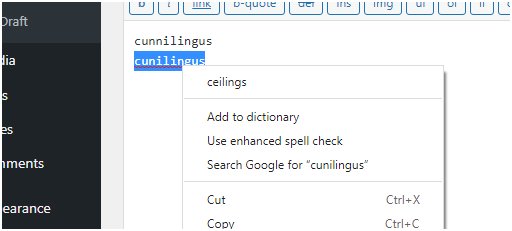
Almost certainly this was not a deliberate choice of the WordPress coders. I don’t have time today to research the source of the spellcheck routine and library that causes this result, but since WordPress is open source, it’s likely to involve logic that was coded elsewhere. This is hardly new behavior in a software product; Violet Blue caught Microsoft doing it with Word’s spellcheck way back in 2007. Nor is this the first time ErosBlog has covered search invisibility, search suggestion censorship, and arbitrary sexy-keyword “blue lists” that have been widely shared for censorship purposes in the tech industry. My guess is that WordPress is just one of the many software products that lazily or unthinkingly incorporates a library built around one of those ancient and stale blue lists.
Similar Sex Blogging:
November 2nd, 2021 -- by Bacchus
I’ve been aware since at least 2014 that there were shadow porn channels on the Roku. These porn channels are usually associated with major-brand pay pornsites, they don’t show up in the Roku channel list, but they’ve long been available nonetheless. Well, that’s all over now. The pornocalypse comes for us all.
XBiz reports:
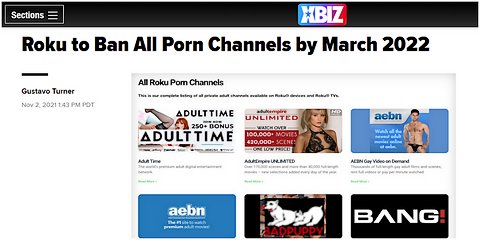
LOS ANGELES — Roku announced a change of policy concerning private channels last week at its annual developer conference that will result in an effective ban of porn channels by March 1, 2022.
…
Companies affected by the ban include Pornhub, AdultEmpire, AEBN, Wicked, Adult Time and Naughty America.
All of these companies’ Roku channels are expected to disappear on March 1, 2022.
Roku has been the target of a well-funded campaign by religiously motivated anti-porn crusading group NCOSE (formerly known as Morality in Media).
Morality in Media — our ancient enemy — strikes again!
Similar Sex Blogging:
July 25th, 2021 -- by Bacchus
The #Pornocalypse comes for us all — even mild-mannered gardeners!

No lesser source than the Associated Press reported out this sad tale of a New York state gardening group that was put at risk of deletion by too many automatic robot-moderation flags for the word “hoe”, which Facebook apparently thinks means the same thing as “ho”.
Moderating a Facebook gardening group in western New York is not without challenges. There are complaints of wooly bugs, inclement weather and the novice members who insist on using dish detergent on their plants.
And then there’s the word “hoe.”
Facebook’s algorithms sometimes flag this particular word as “violating community standards,” apparently referring to a different word, one without an “e” at the end that is nonetheless often misspelled as the garden tool.
Normally, Facebook’s automated systems will flag posts with offending material and delete them. But if a group’s members — or worse, administrators — violate the rules too many times, the entire group can get shut down.
Elizabeth Licata, one of the group’s moderators, was worried about this.
…
When a group member commented “Push pull hoe!” on a post asking for “your most loved & indispensable weeding tool,” Facebook sent a notification that said “We reviewed this comment and found it goes against our standards for harassment and bullying.”
…
“And so I contacted Facebook, which was useless. How do you do that?” she said. “You know, I said this is a gardening group, a hoe is gardening tool.”
Licata said she never heard from a person and Facebook, and found navigating the social network’s system of surveys and ways to try to set the record straight was futile.
Contacted by The Associated Press, a Facebook representative said in an email this week that the company found the group and corrected the mistaken enforcements. It also put an extra check in place, meaning that someone — an actual person — will check offending posts before the group is considered for deletion.
“We have plans to build out better customer support for our products and to provide the public with even more information about our policies and how we enforce them,” Facebook said in a statement in response to Licata’s complaints.
Note, however, that Facebook did not promise a better way to get in touch than to have an Associated Press reporter make phone calls.
Similar Sex Blogging:
|
|


























